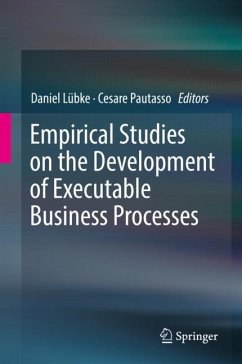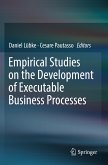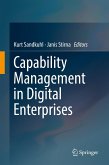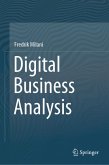This book collects essential research on the practical application of executable business process modeling in real-world projects, i.e., model-driven solutions for the support and automation of digital business processes that are created using languages such as BPEL or BPMN. It mainly focuses on empirical research, but also includes an up-to-date cross-section of case studies in order to assess examples of BPM's practical impact in the industry.
On the one hand, executable models are formally and precisely defined so that computers can interpret and execute them; on the other, they are visualized so that humans can describe, document and optimize business processes at a higher level of abstraction than with traditional textual programming languages. While these important research areas have long been separated from one another, this book is an attempt at cross-fertilization, driven by the insight that business processes are the software behind today's digital organizations, and that achieving a precise representation of such processes is key to their reliable execution. Consequently, the book presents various case studies and experiments that investigate questions of interest to both academia (e.g., identifying challenges for which no solution exists; sharing new insights into how existing approaches are actually used) and industry (e.g., guidelines on using certain technologies and on modeling comprehensible and executable processes).
Both researchers and practitioners will benefit from the presentation of how concepts are transformed into working solutions. The studies are presented in a structured manner and with sufficient rigor to be considered empirical research, further enhancing the book's value for the research community, while practitioners will find concrete guidance on making the right decisions for their projects.
On the one hand, executable models are formally and precisely defined so that computers can interpret and execute them; on the other, they are visualized so that humans can describe, document and optimize business processes at a higher level of abstraction than with traditional textual programming languages. While these important research areas have long been separated from one another, this book is an attempt at cross-fertilization, driven by the insight that business processes are the software behind today's digital organizations, and that achieving a precise representation of such processes is key to their reliable execution. Consequently, the book presents various case studies and experiments that investigate questions of interest to both academia (e.g., identifying challenges for which no solution exists; sharing new insights into how existing approaches are actually used) and industry (e.g., guidelines on using certain technologies and on modeling comprehensible and executable processes).
Both researchers and practitioners will benefit from the presentation of how concepts are transformed into working solutions. The studies are presented in a structured manner and with sufficient rigor to be considered empirical research, further enhancing the book's value for the research community, while practitioners will find concrete guidance on making the right decisions for their projects.









